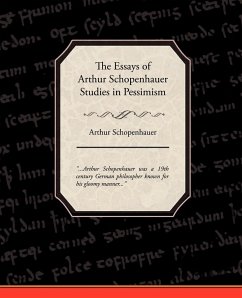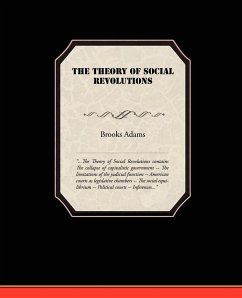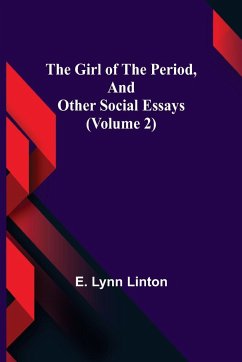
The Essays of Arthur Schopenhauer Studies in Pessimism
Versandkostenfrei!
Versandfertig in 1-2 Wochen
19,99 €
inkl. MwSt.

PAYBACK Punkte
10 °P sammeln!
Arthur Schopenhauer was a 19th century German philosopher known for his gloomy manner. Schopenhauer's The World as Will and Representation emphasized the role of man's basic instinct, which Schopenhauer described as the will to exist, or "will". Schopenhauer is known for his analysis of human motivation and the human condition. He argued that emotional, physical, and sexual desires can never be truly fulfilled. Schopenhauer favored a lifestyle of negating human desires, similar to the teachings of Buddhism. The note at the beginning of the text reads. "The Essays here presented form a further ...
Arthur Schopenhauer was a 19th century German philosopher known for his gloomy manner. Schopenhauer's The World as Will and Representation emphasized the role of man's basic instinct, which Schopenhauer described as the will to exist, or "will". Schopenhauer is known for his analysis of human motivation and the human condition. He argued that emotional, physical, and sexual desires can never be truly fulfilled. Schopenhauer favored a lifestyle of negating human desires, similar to the teachings of Buddhism. The note at the beginning of the text reads. "The Essays here presented form a further selection from Schopenhauer's _Parerga_, brought together under a title which is not to be found in the original, and does not claim to apply to every chapter in the volume. The first essay is, in the main, a rendering of the philosopher's remarks under the heading of _Nachtraege zur Lehre vom Leiden der Welt_, together with certain parts of another section entitled _Nachtraege zur Lehre von der Bejahung und Verneinung des Willens zum Leben_. Such omissions as I have made are directed chiefly by the desire to avoid repeating arguments already familiar to readers of the other volumes in this series. The _Dialogue on Immortality sums up views expressed at length in the philosopher's chief work, and treated again in the _Parerga_. The _Psychological Observations_ in this and the previous volume practically exhaust the chapter of the original which bears this title. The essay on _Women_ must not be taken in jest. It expresses Schopenhauer's serious convictions; and, as a penetrating observer of the faults of humanity, he may be allowed a hearing on a question which is just now receiving a good deal of attention among us."














